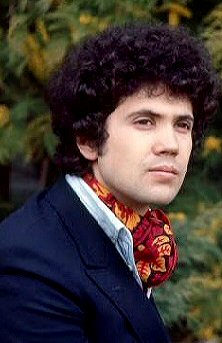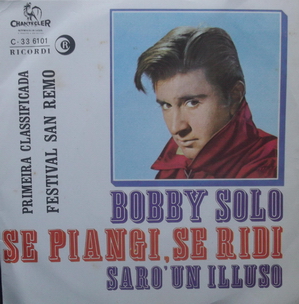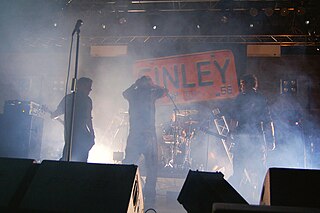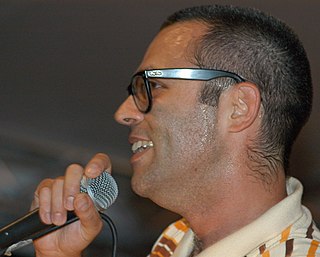
The Hollies are an English rock and pop band formed in 1962. One of the leading British groups of the 1960s and into the mid-1970s, they are known for their distinctive three-part vocal harmony style. Singer Allan Clarke and rhythm guitarist/singer Graham Nash founded the band as a Merseybeat-type group in Manchester, although some of the band members came from towns further north, in east Lancashire. Nash left the group in 1968 to co-form Crosby, Stills & Nash, though he has reunited with the Hollies on occasion. As well as Clarke and Nash other members have included lead guitarist Tony Hicks, rhythm guitarist Terry Sylvester, bassists Eric Haydock and Bernie Calvert, and drummers Don Rathbone and Bobby Elliott.

Umberto Antonio Tozzi is an Italian pop and rock singer and composer. Throughout his career, he has sold over 70 million records in different languages internationally, and his biggest international hits are: "Stella Stai", "Gloria", "Tu" and "Ti Amo".

Lucio Battisti was an Italian singer-songwriter and composer. He is widely recognized for songs that defined the late 1960s and 1970s era of Italian songwriting.

Vasco Rossi, also known mononymously as Vasco or with the nickname Il Blasco, is an Italian singer-songwriter and poet. He has published 30 albums and written over 250 songs, as well as lyrics for other artists.
Robert Neale Lind is an American folk-music singer-lyricist who helped define the 1960s folk rock movement in the U.S. and UK. Lind is well known for his transatlantic hit record, "Elusive Butterfly", which reached number 5 on both the US and UK charts in 1966. Many musicians have recorded songs by Lind, who continues to write, record and perform.

Danilo Rea is an Italian jazz pianist. He is a graduate of the Santa Cecilia music conservatory in Rome. He made his debut with the "Trio di Roma" in 1975.

Giulio Rapetti, best known as Mogol, is an Italian music lyricist. He is best known for his collaborations with Lucio Battisti, Gianni Bella, Marcella Bella, Adriano Celentano and Mango.

Iva Zanicchi is an Italian pop singer and politician. She has a mezzo-soprano voice and is nick-named by the press as the "Eagle from Ligonchio".

"Se piangi, se ridi" is a song written by Gianni Marchetti, Roberto Satti and Mogol. It was first performed during the 15th edition of the Sanremo Music Festival, in January 1965, when Italian singer Bobby Solo and American folk band The New Christy Minstrels performed two different versions of the song, winning the competition.

Finley is an Italian rock band formed in Legnano, Lombardy, Italy in 2002.
Colin Hicks & The Cabin Boys were a British rock and roll band, led by Colin Hicks, the younger brother of singer Tommy Steele.

Rita the American Girl is a 1965 Italian "musicarello" film directed by Piero Vivarelli with Totò and Rita Pavone.

"Let's Live for Today" is a song written by David "Shel" Shapiro and Italian lyricist Mogol, with English lyrics provided by Michael Julien. It was first recorded, with Italian lyrics, under the title "Piangi con me" by the Italian-based English band the Rokes in 1966. Later, when "Piangi con me" was due to be released in the United Kingdom, publisher Dick James Music requested that staff writer Julien compose English lyrics for the song. This English-language version was released by the Rokes in April 1967.
Michael Julien, also known as Peter Warne, was a British songwriter, who was the co-writer of a number of hit songs around the world.

Golden Grass is the first greatest hits album by the American rock band the Grass Roots, released in November 1968 by Dunhill Records. The LP's release in the fall of 1968 followed the success of the group's highest-charting single, "Midnight Confessions". It featured a song written by Carole King and Toni Stern titled "Lady Pleasure", which was previously unreleased by the group, as well as a new single, "Bella Linda", which was originally written by the Italian songwriting duo of Lucio Battisti and Mogol. The Grass Roots' version of the song, which was given English lyrics by Barry Gross and Steve Barri, charted at No. 28. Golden Grass is the highest charting Grass Roots album at #25, and was certified gold by the RIAA in 1970.

"La bambola" is an Italian pop song written by Franco Migliacci, Bruno Zambrini and Ruggero Cini, and performed by Patty Pravo. The song had been previously refused by several artists, including Gianni Morandi, Little Tony, Gigliola Cinquetti, Caterina Caselli and The Rokes.

Francesco Di Gesù, better known by his stage name Frankie Hi-NRG MC, is an Italian rap and hip hop artist of Sicilian descent, born in Turin and raised between Caserta and Città di Castello. He has been active since the early stages of the Italian hip hop movement in the early 1990s and is regarded as one of the pioneers of the genre. He predominantly discusses politics and societal issues in his music, his debut single "Fight da faida" complains about various issues, including the Mafia and its ties with Italian politicians, the Ustica massacre, the Bologna massacre and the Operation Gladio. He has also participated in the Sanremo Music Festival in 2008 with his song "Rivoluzione" and again in 2014 with "Pedala" and "Un uomo è vivo".
Italian beat is the Italian form of beat music, circa 1963 to 1968, inspired mainly by British popular music of the 1960s.

"Ma che freddo fa" is a 1969 song composed by Claudio Mattone (music) and Franco Migliacci (lyrics). The song premiered at the 19th edition of the Sanremo Music Festival with a double performance of Nada and The Rokes, placing at the fifth place. The first verses include a citation of Donovan's "Laléna". Nada's version was a massive success, selling about one million copies, mainly in the Italian and Spanish markets.
I Tubi Lungimiranti was a musical group formed in Fano, Italy in 1964. The group was part of the 1960s Italian Beat music movement. They later became a cult group for Dirty Acoustics and Garage Beat.














